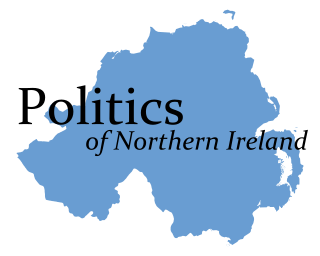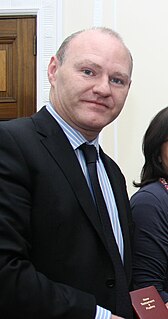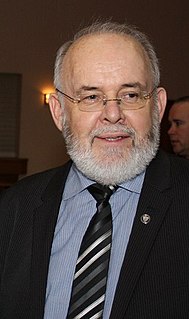
Gerard Adams is an Irish republican politician who was the Leader of the Sinn Féin political party between 13 November 1983 and 10 February 2018, and has been a Teachta Dála (TD) for Louth since the 2011 general election. From 1983 to 1992 and from 1997 to 2011, he was an abstentionist Member of Parliament (MP) of the British Parliament for the Belfast West constituency.

West Tyrone is a county constituency in Northern Ireland, represented in the House of Commons of the Parliament of the United Kingdom. It elects one Member of Parliament (MP) by the first past the post voting system.

Mid Ulster is a parliamentary constituency in the British House of Commons.

East Antrim is a constituency represented in the House of Commons of the UK Parliament since 2005 by Sammy Wilson, a member of the Democratic Unionist Party. The constituency has voted for unionist candidates since its re-creation in 1983.

Belfast South is a parliamentary constituency in the United Kingdom House of Commons. It has been represented since 2017 by Emma Little-Pengelly of the Democratic Unionist Party.

Elections in Northern Ireland are held on a regular basis to local councils, the Northern Ireland Assembly, the Parliament of the United Kingdom, and to the European Parliament.

Alasdair McDonnell is an Irish politician who is a member of the Social Democratic and Labour Party (SDLP), and was the Member of Parliament for Belfast South from 2005 to 2017. He was also a Member of the Legislative Assembly of Northern Ireland for Belfast South from 1998 to 2015. He was Leader of the SDLP from 2011 to 2015.
Joseph Gerard Hendron is a Northern Ireland politician, a member of the moderate Irish nationalist Social Democratic and Labour Party (SDLP).

The third elections to the Northern Ireland Assembly were held on 7 March 2007 when 108 members were elected. The election saw endorsement of the St Andrews Agreement and the two largest parties, the Democratic Unionist Party (DUP) and Sinn Féin, along with the Alliance Party, increase their support, with falls in support for the Ulster Unionist Party (UUP) and the Social Democratic and Labour Party (SDLP).

Paul John Maskey is an Irish republican politician in Northern Ireland who is a member of Sinn Féin. He served as a Sinn Féin member (MLA) of the Northern Ireland Assembly for Belfast West from 2007 to 2012. He is currently Member of Parliament (MP) for the Westminster constituency of Belfast West, but in line with Sinn Féin's policy of abstentionism he has not taken his seat there.

The 2011 election to the Northern Ireland Assembly took place on Thursday, 5 May, following the dissolution of the Northern Ireland Assembly at midnight on 24 March 2011. It was the fourth election to take place since the devolved assembly was established in 1998.
Events during the year 2011 in Northern Ireland.

The 2010 United Kingdom general election in Northern Ireland occurred on 6 May 2010 and all 18 seats in Northern Ireland were contested. The election saw Sinn Féin win the most votes at a Westminster election for the first time and saw the Democratic Unionist Party win the most seats. The Ulster Unionist Party fought the election as allies of the UK Conservative Party, under the banner of Ulster Conservatives and Unionists - New Force. The UUP failed to win any seats for the first time in over 100 years.

The 2005 United Kingdom general election in Northern Ireland was held on 5 May 2005 and all 18 seats in Northern Ireland were contested. The election resulted in the Ulster Unionist Party losing its place as the largest Northern Irish political party at Westminster, being replaced by the Democratic Unionist Party. Both the DUP and Sinn Féin increased their share of the vote as well as their number of seats. The Social Democratic and Labour Party were unable to regain its formerly held status as the largest nationalist political party in Northern Ireland, though they retained 3 seats overall, albeit with a reduced share of the vote.

A by-election for the UK House of Commons constituency of Mid Ulster in Northern Ireland was held on 7 March 2013. The election was triggered by the resignation of Martin McGuinness, who had been elected to the seat in 1997 as the Sinn Féin candidate. The election was won by Francie Molloy, also of Sinn Féin.

The 2015 United Kingdom general election in Northern Ireland was held on 7 May 2015 and all 18 seats were contested.

The 2017 election to the Northern Ireland Assembly was held on 2 March 2017. The election was held to elect members (MLAs) following the resignation of deputy First Minister Martin McGuinness in protest over the Renewable Heat Incentive scandal. McGuinness' position was not filled, and thus by law his resignation triggered an election. It was the sixth election since the Assembly was re-established in 1998, and the first to implement a reduction in size to 90 MLAs.

Gerry Carroll is a People Before Profit politician from Belfast, Northern Ireland, who has represented the Belfast West constituency in the Northern Ireland Assembly since May 2016. From 2014 until 2016 he also represented the Black Mountain district electoral area on Belfast City Council.

A by-election was held in the UK Parliament constituency of West Tyrone on 3 May 2018, following the resignation of Barry McElduff. McElduff had become embroiled in a social media controversy which had resulted in his suspension from Sinn Féin on 8 January. He announced his resignation on 15 January 2018.




























